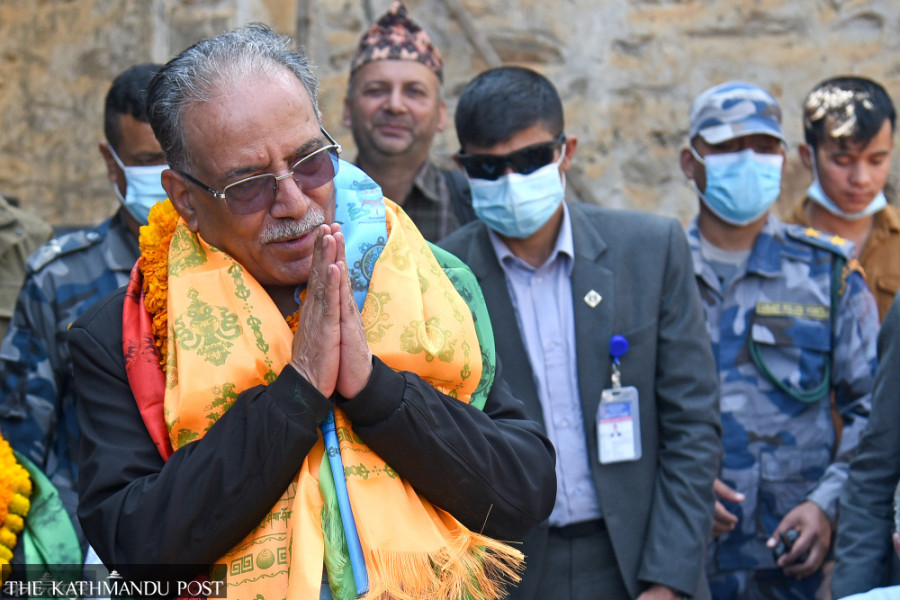Politics
Internal rift emerges as a big headache for Maoist Centre
Many party workers are dissatisfied with the Maoist leadership’s selection of candidates.
Tika R Pradhan
On October 19, Devi Khadka, tendered her resignation as Dolakha district chief of the CPN (Maoist Centre), expressing her discontent over the selection of the first-past-the-post candidate from her district.
Ganga Bahadur Karki is in the fray from the Maoist Centre as a common candidate of the Nepali Congress-led alliance from the district.
Leaders of the Maoist Centre, one of the key constituents of the four-party coalition eyeing to become kingmaker after the November 20 polls, have come to an agreement that they face internal challenges, more than those posed from outside.
The party leaderhip’s selection of candidates has left many Maoists dissatisfied and this could hamper its electoral outcome despite the party forging an alliance.
It’s a problem of the parliamentary system that many leaders remain dissatisfied and act against the party’s official candidates, said Lilamani Pokhrel, a Maoist secretary.
“I can’t rule out the possibility of such dissatisfaction affecting our poll prospects, but we will try our best to address them all.”
The Maoist Centre has forged an electoral alliance with the Congress, CPN (Unified Socialist) and the Rastriya Janamorcha. However, the Maoist Centre has around five dozen rebel candidates challenging the party’s official candidates in both House of Representatives and provincial assembly elections. Also, dissidents from other alliance member parties have also filed rebel candidacies in both parliamentary and provincial elections.
Amid concerns over whether supporters of other alliance members would vote for Maoist candidates, Maoist Centre leaders are worried that its candidates may lose the election if the rebellion in the party is not managed.
The party has 13 rebel candidates in 12 House seats allocated to the Maoist Centre, including five from the same party and eight from its partner, Nepali Congress. Also, there are 45 rebels from different parties that are partners of the alliance in 40 of the 111 provincial assembly seats allocated to the party.
The Maoist Centre has fielded 47 candidates among the 165 House seats in the first-past-the-post (FPTP) category and 111 candidates in 330 provincial seats.
In the 2017 polls, when the Maoists had forged an electoral alliance with the UML, they had fielded 68 House candidates and won 36 seats. But party insiders fear that this time around, vote transfer from Congress supporters would not be so easy. In 2017, the UML and the Maoists had formed a “left alliance,” meaning that the partners had more similarities than differences.
Amid the challenge mounted by rebels, party leaders like Khadka, who are dissatisfied with the selection of candidates, add to the threat. Even some top leaders seem unhappy with the party’s decisions. Deputy General Secretary Haribol Gajurel is one of them. The senior leader believed to be close to party chair Dahal was denied a ticket from his hometown Sindhuli arguing that he is “unpopular.” Gajurel has registered his note of dissent at the party headquarters.
“I have told the chairman that the party’s office bearers should meet and clarify to me why I was denied a ticket,” Gajurel told the Post. “This kind of behaviour could affect the party’s performance in the elections.”
Many Maoist leaders have quit the party accusing that they were ignored by the leadership.
Dhruba Parajuli, a former politburo member, is contesting from Sindhupalchok as an independent after quitting the Maoist party. Dissatisfied with the working style of the party leadership, Parajuli, who had won the 2008 Constituent Assembly polls from Sindhupalchok, abandoned the party.
Weeks before nomination filing, Hemraj Bhandari, a politburo member, left the party, along with the members of the Maoist Centre Dhankuta district committee. Bhandari is now contesting as an independent from the district.
Also, there is dissatisfaction among the leaders for those coming from Mohan Baidya’s party are getting ‘opportunities’ repeatedly.
A significant number of leaders who had deserted the party along with Baidya had returned to the mother party under Ram Bahadur Thapa’s leadership. Dev Gurung, who is currently party general secretary, and Pampha Bhusal, the incumbent minister of energy, are among those who came from Baidya’s party.
“Those who quit the party along with Baidya and later returned to the party have been getting all the benefits and that trend continued in the selection of candidates as well,” said a politburo member on the condition of anonymity, whose aspiration to become a candidate was foiled by a newcomer. “Though the leaders have not made their discontent public, the silent dissatisfaction could be reflected in the elections.”




 8.79°C Kathmandu
8.79°C Kathmandu














